Meet NJAPA’s Kevin Monaco
BY AsphaltPro Staff
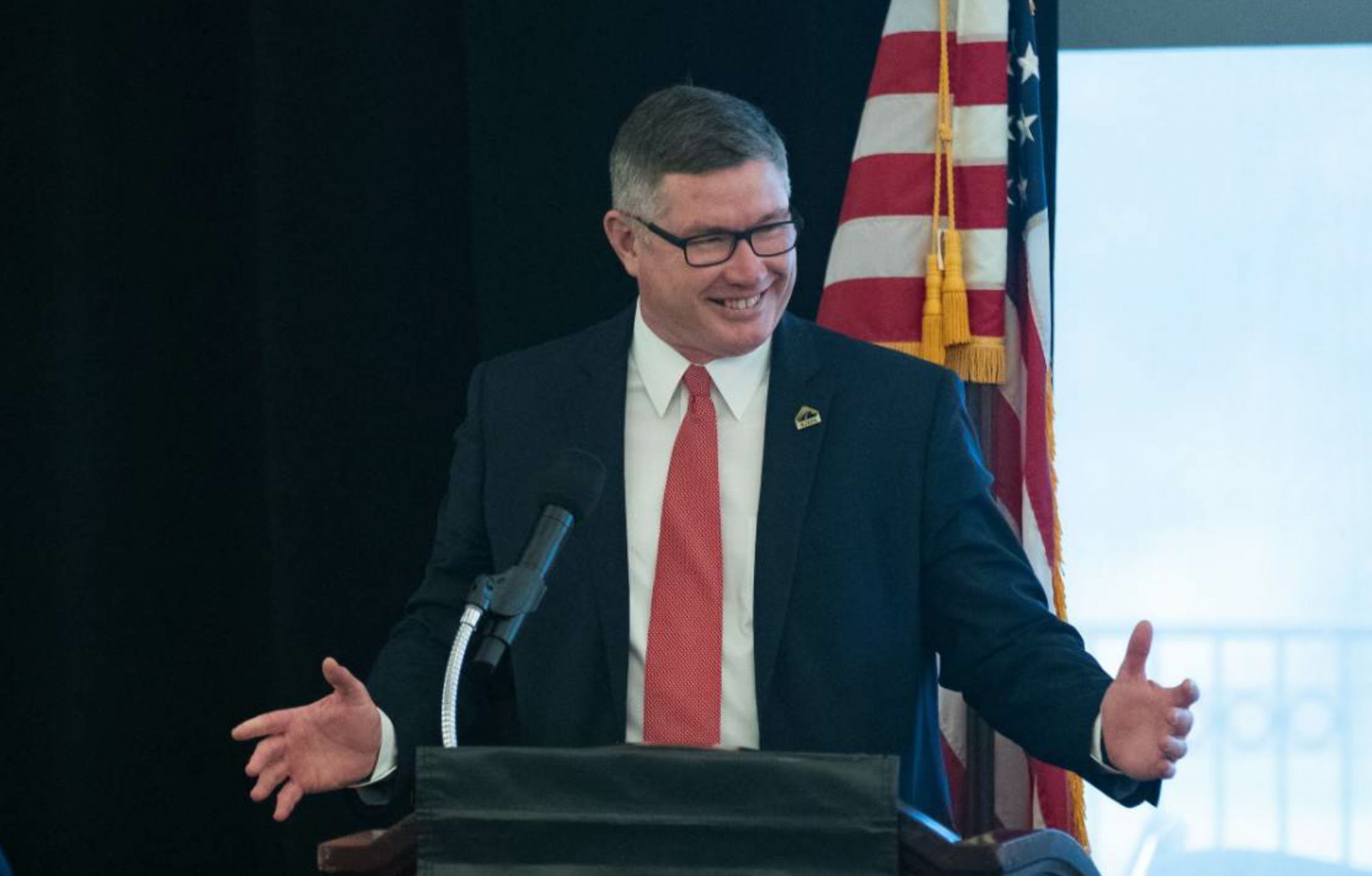
The New Jersey Asphalt Pavement Association (NJAPA), Ewing, N.J, is the oldest construction related trade association active in New Jersey, founded in 1933. Today, the association represents more than 120 member firms, including 18 asphalt producers–close to 100 percent market share of asphalt production in the state.
AsphaltPro spoke with Kevin P. Monaco, NJAPA’s executive director since 2012, to learn about how NJAPA engages with state legislators and addresses the workforce shortage in the state of New Jersey.
What are the top two or three ways you have increased membership in the association?
We have expanded our outreach to related industry partners, including engineering firms, and have also made it a priority to have many New Jersey college and university engineering departments engaged as academic affiliate members.
What is your favorite method for recruiting new asphalt professionals to the industry in general?
We make a concerted effort to be fully engaged with our colleges and universities, community colleges, trade schools and workforce development boards. We work to show the diversity of career options within our industry.
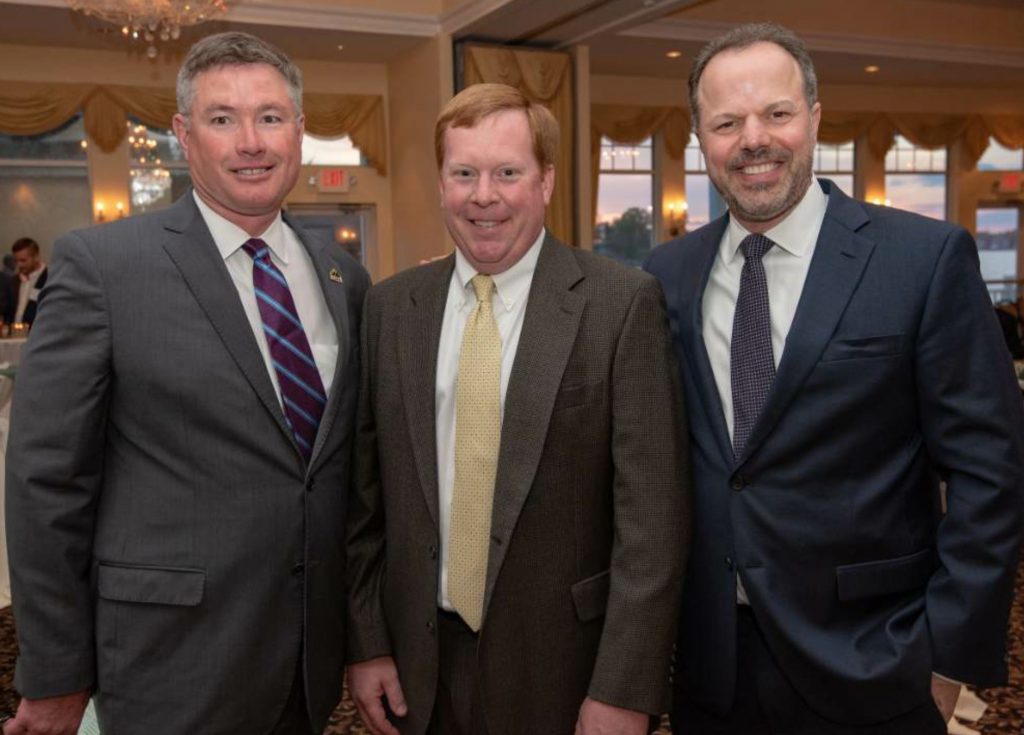
Kevin Monaco with NJAPA President Peter Kochek and NJAPA Counsel Brian Montag
In what month do you hold your annual meeting?
We host our annual paving conference in March of each year, an annual awards program during May, and a holiday luncheon to benefit our scholarship fund during December. Our annual paving conference includes a trade show and industry exhibits.
We provide approximately $16,000 to $18,000 annually to high school and college students who have immediate family working for an NJAPA member firm. We provide some level of scholarship to every applicant, as we consider these young men and women part of our family.
Do you have a staff that assists in preparing the annual meeting?
Our staff includes Technical Director James Purcell, P.E., and Office Manager Stacey Lindenmuth. We also receive assistance in planning the annual paving conference from a conference committee, which includes Rutgers University, NJDOT, Port Authority of NY/NJ, FHWA and association members.
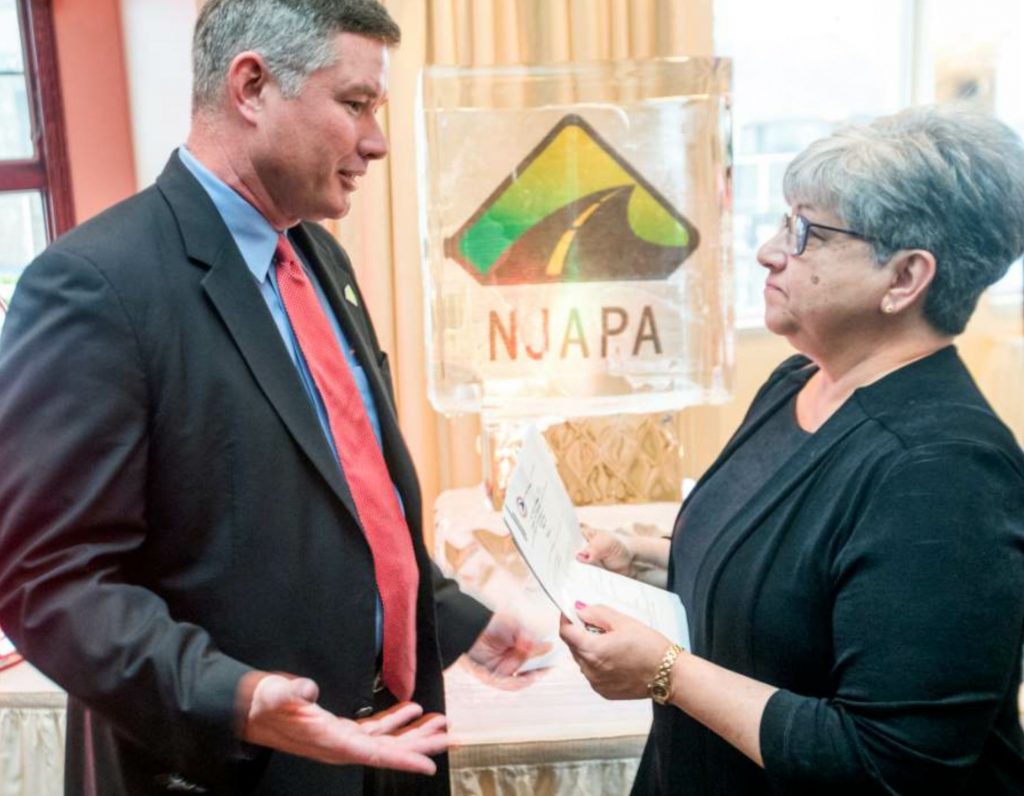
Kevin Monaco with NJDOT Commissioner Diane Gutierrez-Scaccetti
Does your staff hold educational seminars or webinars for members throughout the year, separate from the annual meeting/convention?
Yes, we host several educational events on a wide range of issues including quality control, paving operations, safety, human resources and employment law, and environmental regulations.
Our educational programs are primarily in person. Some programs are members-only and are generally free, other programs have member and non-member pricing. Recent programs have included nuclear gauge safety training, human resources and employment law updates, and federal and state environmental compliance regulatory updates.
About how many member asphalt projects, plant tours and open houses do you visit per year?
I work to visit at least one paving project and one asphalt plant each quarter. I also make time to visit with company owners and senior executives one on one throughout the year. In addition, we conduct plant tours for legislators, college students and other key interest groups several times per year. I typically attend any open house hosted by a producer member.
The association typically arranges the tours in coordination with our members. We consider them an incredibly valuable opportunity for young people and policy makers to learn more about our operations and better understand the extraordinary contribution we make to the economy, the environment and the quality of life in our communities.
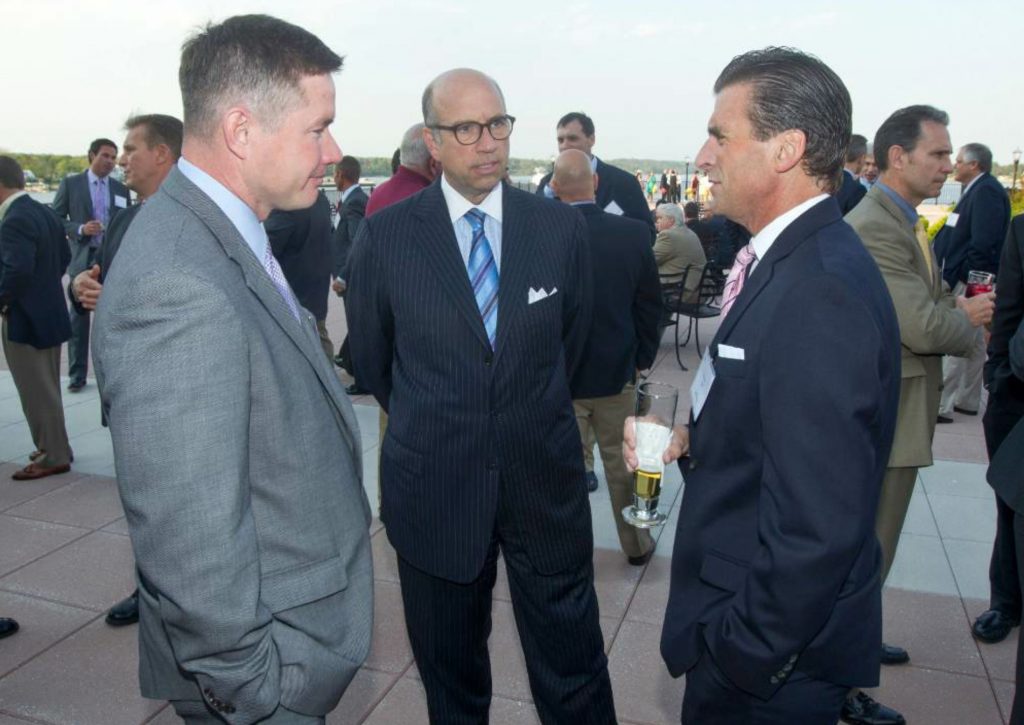
Kevin Monaco (left) with former NJDOT Commissioner Jim Simpson and NJAPA member Dennis Hart
About how many state agency or DOT meetings do you attend per year?
NJAPA staff meets frequently with governmental agencies, project owners and other key decision makers in our industry. This includes NJDOT, FHWA, Rutgers and Rowan Universities, NJ Turnpike Authority, NJ Department of Environmental Protection, and others. We meet directly with representatives of NJDOT at least 20 to 30 times per year.
On a scale of 1 to 5 (1 being none at all; 5 being very much), how much of a threat to your members’ market share/livelihood is the concrete industry in your state?
One. We actually work cooperatively on funding issues and regulatory issues with the NJ Concrete & Aggregate Association.
On a scale of 1 to 5 (1 being none at all; 5 being very much), how much difficulty are your members having in finding qualified workers for their asphalt paving or production crews?
4 to 5. It is always difficult to find and retain good employees. We have much to offer as an industry and need to continue educating the public and young people in particular about the diversity and quality of employment provided by our industry.
Could you give an example (or two) of a way your state APA assists members with workforce development?
We assist by working cooperatively to build strong relationships with universities and community colleges, we participate in career fairs and invite students to attend our annual paving conference free of charge.
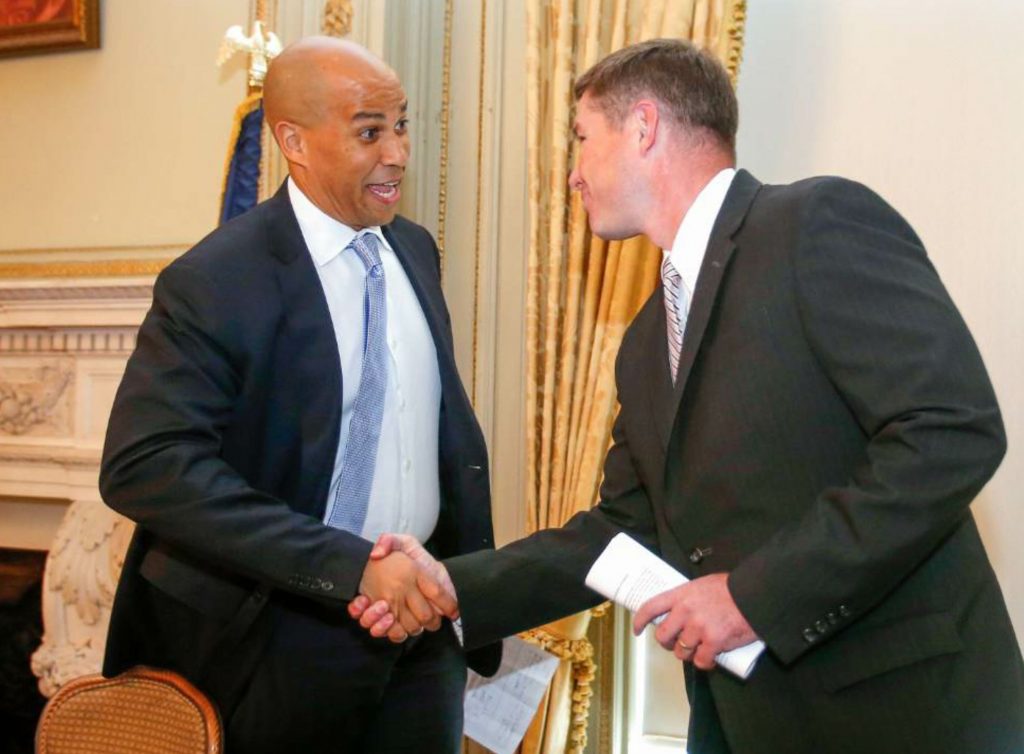
Kevin Monaco greets U.S. Senator Cory Booker.
On a scale of 1 to 5 (1 being none at all; 5 being very much), how involved are your state elected officials in transportation issues such as funding and infrastructure improvements?
Our state legislators have significant involvement in reviewing and approving the annual Capital Program and overall NJDOT budget. We work very hard to maintain relationships with key legislative leaders and members of key committees including the budget and transportation committees.
On a scale of 1 to 5 (1 being none at all; 5 being very much), how involved are your asphalt members in transportation issues such as funding and infrastructure improvements?
Our members are typically involved and fully engaged in their local communities through a range of civic and charitable activities. We have a strong grassroots network in place which we can activate as necessary. Our members have always been very supportive of our efforts in this regard.
Could you share an example of a time when your state APA hosted elected officials to educate them on the need for highway funding, asphalt materials, construction workforce development, etc.?
Most recently, the New Jersey Legislature approved an eight-year, $2 billion per year funding program which relied in large part on an increased motor fuels tax. The effort also included a public question to constitutionally dedicate the increased funds to transportation uses. This public question faced significant opposition, including efforts by our previous lieutenant governor and our major statewide talk radio station. NJAPA hired an outside PR firm and developed a range of social media outreach efforts including paid and earned media. NJAPA also participated in a broader industry coalition which included press conferences, direct mail, radio and TV advertisements and more. The public question was approved 54 percent to 46 percent.
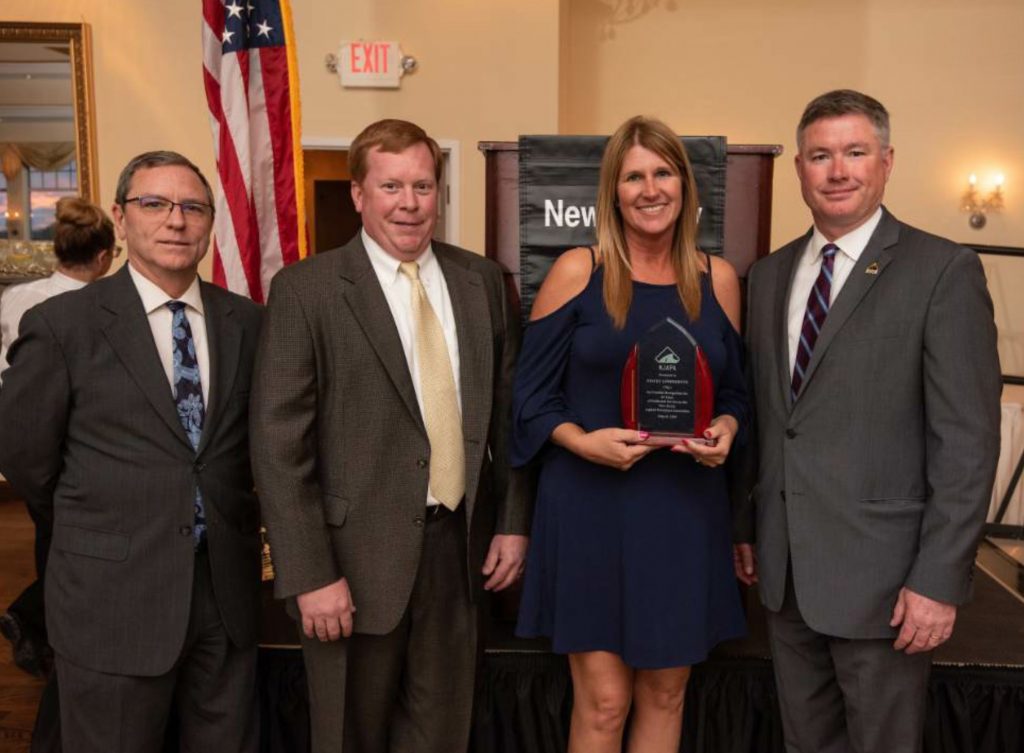
NJAPA President Peter Kochek and NJAPA staff recognize Stacey Lindenmuth on 25 years of service
Get to Know Kevin Monaco
Why did you join the asphalt industry?
I worked previously as an ocean lifeguard for many years. As I was nearing graduation from my master’s degree in public policy from Rutgers University, I was contacted by an older lifeguard who worked at a major construction association and asked if I would be interested in joining his organization to work on legislative and regulatory issues. I started work the day of my graduation and worked with that association for 12 years.
What do you see as the most important part of your job as an executive director of a SAPA?
Promoting our product as widely as possible and serving as an advocate for our members and our industry.
What is the most challenging part of your job, and why do you think it’s a challenge in your state?
We face the same challenges as other associations, including changing membership demographics. We also work hard to keep policy leaders and decision makers focused on our industry even when there is not a crisis or pressing issue.
What do you find most enjoyable about your job as an executive director of a SAPA?
Without question the people with whom I have the pleasure of working with and representing are the best part of this job. We have the privilege of working with some of the hardest working, smartest, down to earth people in an industry that is so critical to the economy, the environment and the quality of life in our state and nation.
You have the opportunity to develop tremendous long-lasting friendships and you learn something new every day.
What has been the most rewarding experience for you during your time as the executive director?
I always take satisfaction from achieving a long-term, challenging policy issue such as passage of legislation, major revisions to regulations or specifications, and, of course, approval of transportation funding increases.
